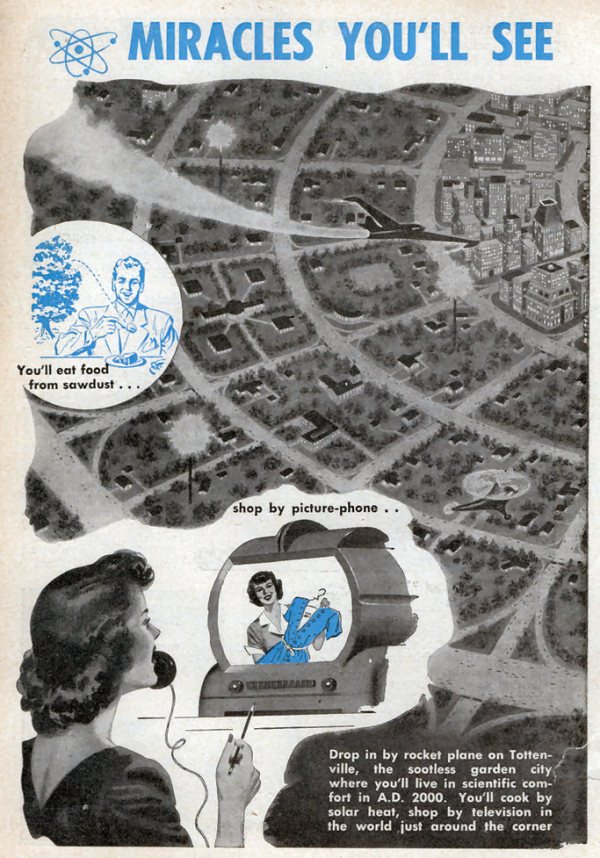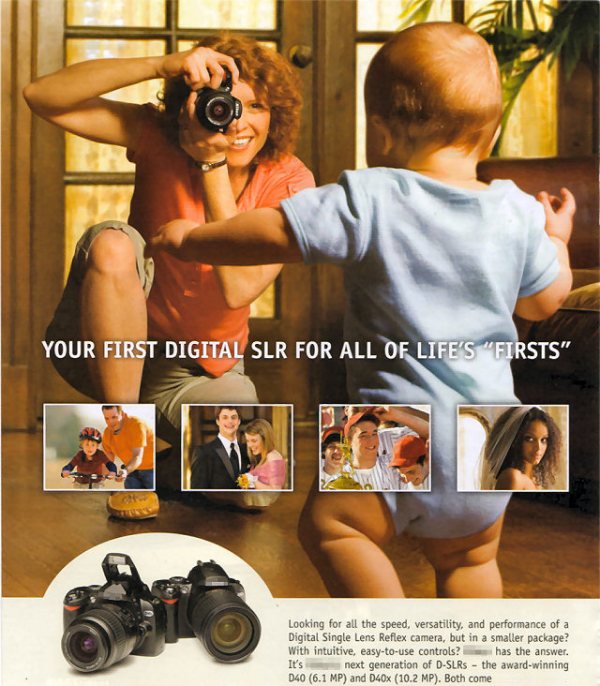When I was a kid, I liked leafing through my dad’s old magazines from the 1950s and 60s. I especially liked reading articles that speculated about what life might be like in the year 2000. Back in the post-war period, people liked to fantasize about about new developments in technology and how they would benefit humankind. When the turn of the century was finally on the horizon and everyone was partying like it was 1999, I was also looking forward to it, but for a different reason. I fully expected newspaper reporters to start digging up those old science magazines, and then write comprehensive articles that would compare our early 20th-century dreams to our present-day reality.
To my disappointment, I didn’t see any of these comparisons on televison, magazines or in the local papers. So I decided to start searching for these “futurist” articles myself. Here are some examples from the February 1950 issue of Popular Mechanics.



As you can see from the illustrations, one of the expected benefits of future technology was an substantial increase in our leisure time. I remember seeing other magazine illustrations of a Utopian society in which robots do all the work while the people essentially have the days all to themselves. Back in the 1960s, a musical duo called Zager & Evans bolstered this view by writing a song called In The Year 2525. One verse reads as follows “In the year 5555, your arms are hanging limp at your sides, your legs got nothing to do, some machine is doing that for you”.
That was the plan, but as we all know, that’s not how things turned out. In fact, technology has created what I believe are two supreme ironies of our times.
When I was in high school, every household had a (black rotary) telephone, but no one I knew had cell phones. The only mobile phone I saw was on Hawaii-Five-O, when Steve McGarrett pulled out a black rotary handset from the armrest in his squad car. Today, everyone has a cell phone or even a smartphone. Thanks to the proliferation of personal computers and social media, there are now a multitude of new ways to communicate: E-mail, texting, instant messaging, voice mail, Facebook, Twitter, FaceTime, Skype… Smartphones make these types of communication possible even if we aren’t near a computer. Wherever we are (or more specifically, wherever there is WIFi or cell phone coverage) we can be be contacted and we can communicate with others.
This new variety may sound like a wonderful thing – especially for safety reasons – and it is to some extent. We are now always reachable, and always connected. We are, despite any geographic differences, plugged-in to a social network (or a corporate network) and exist as part of a greater whole.
Irony #1: This exponential increase in connectedness makes one believe that we are rapidly evolving into more social creatures, but we are not. These new communications technologies are actually making us more insular in our activities, and more isolated from each other. A group of teenagers may spend a Friday evening texting or messaging each other, but in reality each individual is spending Friday night alone, in their room. Yo be fair, in my day I could do the same thing by talking on the phone. However, the difference is that I was actually speaking to another person, and hearing their voice. These days, communication is largely Facebook status updates, Twitter posts or text messages – just words on a screen; the human component is almost gone. Emotions and voice inflections are now represented by emoticons.
Irony #2: New technologies were supposed to serve us, free up our days, and provide us with an abundance of leisure time. Now take a look around you. I see people on the streets and on the Go-Train gazing unflinchingly at their Blackberries and smartphones. Only a generation ago, when you left the office, your work day was over and the rest of the day was your own to spend as you wished. Our smartphones have now become our electronic tethers – keeping us always within reach of our boss and co-workers, but really on a short leash. I’ve heard of some people who even take their Blackberry with them on vacation so that they can check in at the office from time to time. We were promised freedom, but today so many of us are metaphorically – but willingly – shackling ourselves to our desks.
In addition to the ironies of connectedness and the promise more leisure time and a reduced work week, I would like to suggest to you that we are actually becoming slaves to our technological gadgets. In my opinion, we are spending our time playing with our high tech toys instead of enjoying our lives to the fullest.
A few weeks ago, I received some mail from my local cable provider. They are now offering streaming video to tablets, but take a look at their advertising campaign – I am just shaking my head in utter disbelief!

Here is a breathtaking shot taken from the top of a small mountain, overlooking a tranquil lake. There’s not a soul around for miles, and the scenery is similar to what one might find near Lake Louise in Alberta – natural, peaceful and unspoiled. The person in the photo may have climbed this mountain himself. If I had scaled that mountain, I would be filled with a tremendous sense of accomplishment as I looked out over the magnificent landscape. In fact, I would probably stretch out my arms, fill my lungs with the fresh, cool air, and exclaim “I am Bob – master of all I behold!”. I would seize the day and soak in every last drop of this moment, as I experienced Nature in all of its majesty and pristine beauty, and then contemplated my place in the world. What I wouldn’t do is watch a baseball game on my tablet…

The second image shows a group of friends sitting on the grass in a park or on a university campus. Most of them have books or notebooks on their laps, so I assume that this is a study group. The subject in this photo, rather than spending his time reading, learning and enjoying the company of his friends, is watching a baseball game on his tablet. My question to him is “Why are you even there, if you obviously have no intention of studying? Stop being so antisocial – put the tablet away, show a little ambition and join your friends!”.
This is what advertising sales pitch has become: ignore your friends; ignore the natural beauty that surrounds you; stop being a participant in life; demote yourself to a mere consumer while you stare hypnotically and mindlessly at your gadgets.
Let me show you an example of how our gadgets have become even more insidious. The other day I was flipping through a magazine and noticed an ad for a digital camera [see below]. One or two of you may be affected by this ad in the very way the advertisers are intending: you think that the photo is adorable, and now you want to buy this particular brand of digital camera. However, most of you – already desensitized to advertising – will be unaffected. You’ll think that it’s a cute yet contrived photo, and then continue flipping the pages of the magazine.

I of course, look at this advertisement and I shudder at the thought of how things have actually turned out for us, after high tech held so much promise.
There are a number of defining moments in our lives: a first job, a first car, a first romance, a proposal of marriage, a wedding, a birth of a child etc. As parents, there are additional defining moments in your life as you watch your children grow up. One of those moments, is your baby’s first steps, as illustrated here.
In this picture, a mother is taking photographs of her infant’s tentative first steps. On the surface, nothing could be lovelier or more heart-warming. If this were a painting, it might be described as Norman Rockwell-esque. The message is straightforward: the mother can now watch this precious moment over and over again, thanks to her new DSLR camera. She can also show the video to other family members who weren’t there to see it, and share the joy with them.
But what is she giving up in return? Eckhart Tolle, in his book A New Life, stresses repeatedly the importance of experiencing life to the fullest and of immersing yourself fully and completely in each moment. This is a life-defining moment for this mother – a moment that she will remember and look back on, for the rest of her life. But how is she experiencing it? Is she living in the moment and soaking in every molecule of this experience? No – of course not; she is a slave to her machine. This piece of high technology has reduced the mother from being an active and essential participant, to being merely an observer. In more theatrical terms, she should be an actress but instead is now functioning as a camera operator. Her arms should be stretched out, encouraging her child, beckoning, and giving constant visual feedback. Instead, her arms are clutching this camera.
Now, let’s look at this scene from the child’s point of view. As you know, humans (and especially babies) are hard-wired to recognize faces – that’s why people keep seeing them in pieces of French toast and other odd items. This mother’s face should be completely visible to her child. They should ne making eye contact. Instead, it is partially obscured by the camera, making her look like some sort of cyborg. She is letting this pivotal moment slip away from her, as she allows herself to become enslaved to the machine – a machine that is literally placed between her and her child during this life-defining moment.
To be fair, I must stress that teachnology is not inherently bad; it just needs to be used appropriately. Cameras are used extensively at other pivotal moments in our lives – weddings – but during these occasions the bride and groom hire a photographer and videographer, and do not take the pictures themselves. They are living in the moment, and are relegating the technology to the sidelines, where it belongs.
Fifty years ago, technology held so much promise for us. It would make our lives easier, give us more leisure time, and enable us to live life on our own terms. Instead, we have allowed ourselves to serve what we have created. Our creation has become our master. It keeps us tethered to our desks, isolates us socially, and even inteferes with life’s most precious and important moments.
Back in 1844 the first Morse Code message was transmitted from Washington to Baltimore. That prescient message was “What hath God wrought?”. I can only imagine what Samuel Morse might have to say about today’s technology. We should heed his words.

Comments on: "Slaves To The Machine" (1)
We can’t blame technology for our choices, and it’s always a choice, whether to answer the cell phone or use the camera. Saying “no” is always an option.